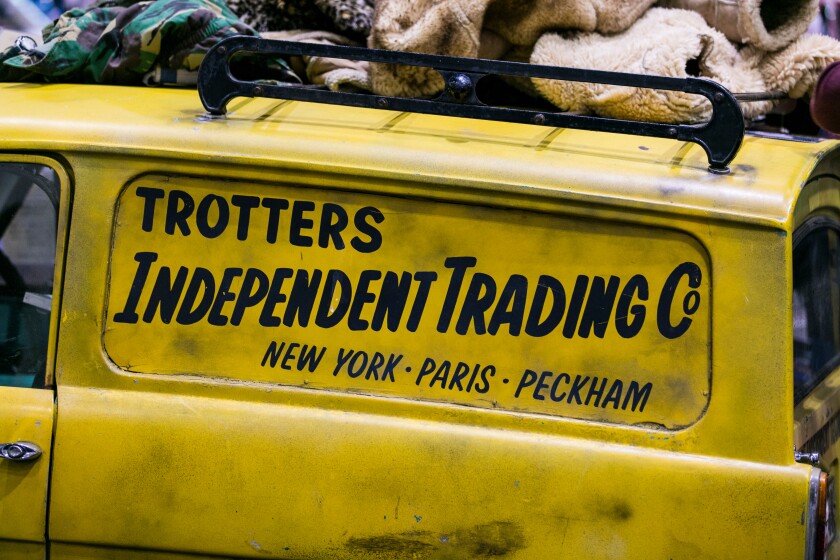There’s something incongruous, amusing even, about a High Court judge sitting down to watch ‘Only Fools and Horses’, a national treasure among British TV sitcoms. Set in south London, its protagonist Derek ‘Del Boy’ Trotter and brother Rodney occupy a gritty world that couldn’t be further from the legal sector’s high society.
But that’s exactly what happened earlier this year when John Kimbell KC, who was acting as a deputy High Court judge at the Intellectual Property Enterprise Court, was asked to decide a major copyright case brought by the family of the show’s late creator, John Sullivan.
The three episodes Kimbell watched were ultimately key to his ruling that Del Boy – renowned for his flashy dress sense, mangled use of French phrases and never-say-die attitude – was a fictional character worthy of copyright protection. As Del Boy himself might have said, “lovely jubbly!”.
In fact, it was the first-of-its-kind decision in England and Wales, and one which, in ruling against an unauthorised rip-off production, left the Sullivan family feeling “utterly relieved”, says son Jim as he reflects on the decision six months on.
“It took the best part of four years to get there, but it was worth it in the end,” he tells Managing IP in an interview.
Rogue trader
Sullivan (junior), who was writing the official ‘Only Fools’ musical in 2018 when he was notified of a suspect show, was instrumental in bringing and then driving the case. The dispute pitted Shazam Productions, the company his dad had set up to protect and monetise the ‘Only Fools’ intellectual property rights, against an unauthorised production called ‘Only Fools The (cushty) Dining Experience’.
While Del Boy, a market trader renowned for selling bootleg goods, would no doubt have seen the irony in suing a rogue outfit, things are very different in the real world. As Sullivan tells Managing IP, the more he looked into the production, the more shocked he was about how much of it was ripped from his late father’s original scripts.
“They were using the characters wholesale, the relationships, history and lore of the original work, but also catchphrases, dialogue, specific jokes, themes and plot points.
“They had essentially written and were selling a new episode of ‘Only Fools and Horses’, and all without permission or a licence. And just to rub salt in the wound, they were marketing their show as being ‘entirely original’,” he says.
Sullivan says he pushed the lawsuit “right from the beginning” and instructed law firm Ashfords to take action. He was instrumental in compiling evidence for the judge, ultimately writing 41 pages and giving testimony in court.
“The most gruelling aspect of it all was going through the original scripts and compiling a list of those key points, noting exactly where, how and why the breach of copyright was taking place. And there were so many points,” he says.
Explaining how time-consuming and tiring this effort was, Sullivan says he provided the lawyers (on both sides) with a detailed breakdown of each and every element of his late father’s original work.
“I know how my dad worked and I know how and why he made certain decisions in writing the characters and stories that he did. To prove that the work was original and uniquely identifiable, I had to show and explain all of this,” he explains.
Hard graft
In court, Sullivan answered questions “in a calm and measured manner”, according to Kimble’s ruling, which is perhaps testament to his composure given how difficult he found watching the unauthorised production.
“A work like ‘Only Fools’ didn’t just magically appear out of thin air. It took years and years of personal experience, skill and hard graft to develop, hone and make successful,” he says of his father’s creation.
“I don’t think it’s fair, in any sense of the word, for someone (anyone) to come along and simply snatch that success up and repackage and sell it on as their own,” he adds.
Ultimately, the court sided with Sullivan and Shazam, ruling that ‘Only Fools The (cushty) Dining Experience’ had infringed the original show’s copyright and was liable for passing off.
Not only was it the first time a UK court had found that copyright subsisted in a character (Del Boy), it was the first case involving ‘fair dealing’ of a copyright work for the purposes of parody or pastiche (the defence being roundly rejected).
Sullivan is now able to focus on the decision’s positive impact despite what was a gruelling case for him and his family, telling Managing IP that they take comfort in the knowledge that their IP can be, and is, protected.
“I mostly hope that the ruling makes people realise that the act of hijacking someone else’s hard work and exploiting it for your own personal gain isn’t a good idea. For the most part, it is well understood within the industry that this isn’t the done thing, which is why things like copyright, agreements and licences exist,” he says.
“I would like to add that while I am against cold, commercialised rip-offs, I am not against genuine, respectful celebrations,” he says. “There are ‘Only Fools’-themed bars and cafes and entire conventions dedicated to the series. I love it when fans express their appreciation of what my dad created, which is why the official and fully licensed ‘Only Fools and Horses’ musical exists.”
It’s hard to know what Del Boy himself would have made of the ruling but, as fans of the show will know, he’d most likely sit back, cigar and drink in hand, and simply say, “cushty”.











